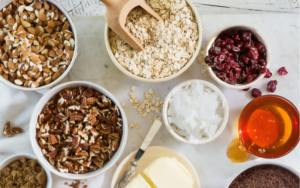Table of Contents
Key Takeaways:
- Vegan protein powders are a sustainable and ethical choice for muscle building and recovery.
- Common ingredients include pea protein, hemp protein, brown rice protein, soy protein, and chia protein.
- It’s essential to choose vegan protein powders that have undergone third-party testing for purity and quality.
- Vegan protein powders can be incorporated into various recipes for added nutritional benefits.
Introduction
The fitness and health industry has witnessed a significant shift towards plant-based products in recent years. Among these, vegan protein powders have emerged as a popular choice for many health enthusiasts. Understanding the ingredients in these powders can help users make informed decisions about their dietary supplements.
Why Vegan Protein Powders?
Vegan protein powders offer numerous benefits over traditional animal-based proteins. They are not only a sustainable choice but also cater to those who prioritize ethical consumption. The environmental impact of plant-based proteins is significantly lower, making them a favorite among eco-conscious individuals.

Common Ingredients in Vegan Protein Powders
| Vegan Protein Source | Amino Acid Profile | Benefits |
|---|---|---|
| Pea Protein | Complete | Easily digestible, versatile in recipes |
| Hemp Protein | Complete | Rich in omega-3 and omega-6 |
| Brown Rice Protein | Incomplete | Hypoallergenic, suitable for those with allergies |
| Soy Protein | Complete | Contains all essential amino acids |
| Chia Protein | Incomplete | High in fiber and omega-3 |
Pea Protein
A complete protein source, pea protein is easily digestible and is often the primary ingredient in many vegan protein powders. It offers a smooth texture and a mild taste, making it a versatile ingredient for various recipes.
Hemp Protein
Hemp protein stands out for its rich content of omega-3 and omega-6 fatty acids. It’s a wholesome protein source that also provides essential fatty acids, making it a nutritious choice for those looking to boost their protein intake.
Brown Rice Protein
For those with allergies or sensitivities, brown rice protein is an excellent choice. It’s hypoallergenic and provides a good protein boost without causing any adverse reactions.
Soy Protein
While soy protein contains all essential amino acids, it has been surrounded by controversies due to its phytoestrogen content. However, when consumed in moderation, it can be a valuable protein source for vegans. For a more detailed review on vegan protein powders, including soy, check out this external article.
Chia Protein
Chia seeds are known for their high fiber and omega-3 fatty acid content. When processed into protein powder, they offer a unique combination of protein and dietary fiber, promoting gut health.
How to Choose the Right Vegan Protein Powder
Choosing the right vegan protein powder involves more than just picking a flavor you like. It’s crucial to check for third-party testing and certifications to ensure you’re consuming a pure product. Understanding the amino acid profile can also help in ensuring you’re getting all the essential amino acids. Lastly, always consider any dietary restrictions or preferences before making a purchase. For expert opinions on vegan proteins, you can refer to this external link.
Potential Concerns with Vegan Protein Powders
Like any product, vegan protein powders come with their set of concerns. It’s essential to be aware of the potential presence of heavy metals in some plant-based powders. Always opt for brands that undergo rigorous third-party testing for contaminants. Additionally, it’s crucial to address and debunk common myths surrounding vegan protein to make an informed choice. For a scientific perspective on vegan protein powders, you might find this external article useful.
Comparing Top Vegan Protein Powder Brands
When it comes to choosing a vegan protein powder, brand reputation plays a crucial role. Here’s a comparison of some of the top brands in the market:
| Brand Name | Primary Protein Source | Added Sugars | Price Range |
|---|---|---|---|
| Vega | Pea Protein | No | $$ |
| Orgain | Hemp Protein | Yes | $$$ |
| Garden of Life | Soy Protein | No | $ |
| Sunwarrior | Brown Rice Protein | No | $$ |
| Nuzest | Pea Protein | Yes | $$$ |
Incorporating Vegan Protein Powders into Your Diet
Vegan protein powders are incredibly versatile and can be added to various recipes. Here are some popular ways to include them in your diet:
- Smoothies and Shakes
Blend your favorite fruits with a scoop of vegan protein powder, almond milk, and some ice. It’s a quick and delicious way to boost your protein intake.
- Baking
From muffins to pancakes, you can add vegan protein powder to your baked goods for an added protein punch.

- Soups and Stews
Stir in a scoop of unflavored vegan protein powder to your soups and stews. It not only enhances the protein content but also gives a creamy texture to your dishes.
Addressing Common Myths
There are several misconceptions surrounding vegan protein powders. Let’s address some of them:
- “Vegan proteins are incomplete.” While some plant-based proteins might lack one or two essential amino acids, combining different sources can provide a complete amino acid profile.
- “Vegan protein powders are not as effective as whey.” Research has shown that with proper intake and a balanced diet, vegan proteins can be just as effective as their animal-based counterparts.
For more myths and facts about vegan proteins, you might find this external article enlightening.
Frequently Asked Questions
1. Are vegan protein powders safe for pregnant women?
Yes, most vegan protein powders are safe for pregnant women. However, it’s always best to consult with a healthcare professional before making any dietary changes during pregnancy.
2. Can children consume vegan protein powders?
While vegan protein powders are generally safe for children, it’s essential to ensure they get a balanced diet and not rely solely on supplements for protein.
3. Do vegan protein powders expire?
Yes, like all dietary supplements, vegan protein powders have an expiration date. Always check the packaging and consume within the recommended timeframe.
For more FAQs on Protein powders, consider visiting this page.



